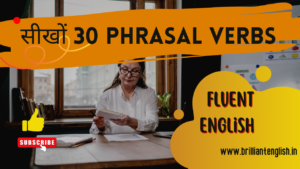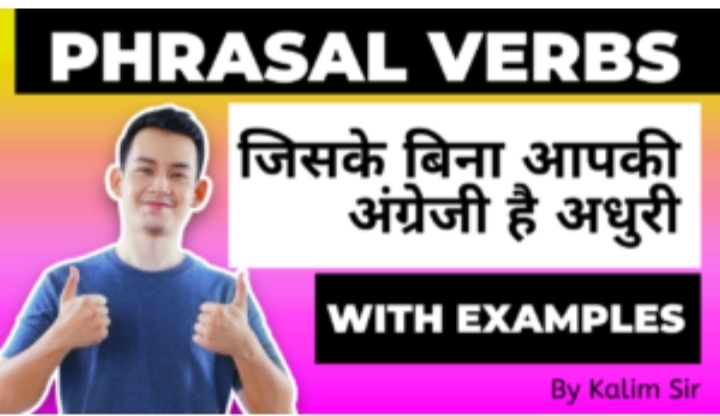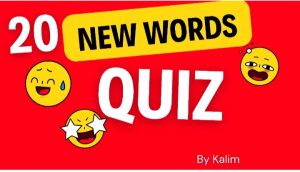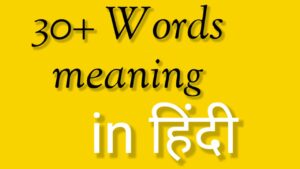विभिन्न प्रकार की Verbs और Phrasal verbs या expressions जो महत्वपूर्ण होने के साथ-साथ कई occasions में उपयोग की जा सकती हैं, जो आम तौर पर एक आम व्यक्ति को समझ में नहीं आती हैं। जो लोग असामान्य events में specific pharasal verbs का उपयोग करने के लिए योग्य हैं, उनके पास बातचीत का एक कला होता है जो व्यक्तियों को अपने phrasal verbs के जादू से उनकी ओर आकर्षित और ध्यान खींचने के साथ प्रभावित कर सकती है और impress कर सकती है और साथ ही उनका दिल और प्रशंसा भी जीत सकती है।
What are Phrasal Verbs in English language ?
Main characteristics of a phrasal verb :
- Phrasal verb एक क्रिया होता है।
- इसमें में अधिकतर एक मुख्य Verb और एक preposition या adverb रहता है।
- ये एक main verb और एक preposition से मिलकर एक या अधिक meaning देता है।
- इसे Verb की तरह five forms में बदला जा सकता है। v¹ v² v³ v⁴ और v⁵
- इसका अर्थ phrasal verb के individual शब्दों से अलग होता है।
जैसे, “take place” अर्थ है “होना/ घटित होना”, “take” एक क्रिया है जिसके पांच रूप होते हैं take, took, taken, taking और takes.
लेकिन अगर हम “take place” का अलग-अलग अर्थ निकाले तो जैसे, take मतलब “लेना” और “place” का meaning होता है “जगह” तो बन जाएगा “जगह लेना” जो की बिल्कुल भी सही नहीं है। Phrasal verbs और preposition या adverb मिलकर एक unique meaning देता है।
“Wear” का मतलब ‘पहनना’ होता है जो आप सब को पता होगा लेकिन अगर “पहनना” को phrasal verb में बोलना चाहें तो अंग्रेजी होगी “put on” (पहनना)।
Why Use Phrasal Verbs ?
Idiomatic expression को हम अपनी अंग्रेजी को सुन्दर और आकर्षित बनाने के लिए use करते हैं, जिस तरह से एक दुल्हन को ज़ेवर और श्रंगार से सजाया जाता है ताकि वह मनमोहक दिखे ठीक उसी तरह से एक phrasal verb का importance होता है English communication skills के लिए। इसलिए मैंने कुछ ख़ास Phrasal Verbs को list में शामिल किया है जिसके अर्थ और उदाहरण नीचे दिए गए हैं।
Phrasal verbs with examples
(1) put out – बुझाना
वह बत्ती बुझाकर सोने चला गया। He put out the light and went to sleep.
(2) set out – यात्रा पर निकलना
बहुत जल्दी हमलोग नई यात्रा पर निकलने वाले हैं। Very soon we are supposed to set out on a new journey.
(3) go through – शुरू से आखिर तक पढ़ना
यह किताब बहुत ही अच्छी है, क्या आपने इसे पढ़ा ? This book is very interesting. Have you gone through it ?
(4) put off – स्थागित / रद्द करना
उसकी शादी अगले साल तक के लिए स्थागित कर दिया गया है। His marriage has been put off till next year.
(5) leave in the lurch – मुसीबत में छोड़ना
मतलबी दोस्त हमेशा तुम्हें मुसीबत में छोड़ देते हैं। Selfish friend always leave you in the lurch.
(6) Turn down – अस्वीकार करना/ ठुकराना
उसने मेरे शादी के प्रस्ताव को ठुकरा दिया। He turned down my marriage proposal.
(7) Turn up – आना / पहुंचना
कल बहुत संख्या में लोग आई पी एल मैच देखने आए। Yesterday a large number of people turned up to see the IPL match.

(8) break down – खराब होना / तोड़-तोड़ कर समझाना
हमारी कार बाज़ार जाते समय खराब हो गई। Our car broke down on the way to the market.
अगर तुम इतना लंबा सबक नहीं समझ पाते तो मैं इसे तोड़-तोड़ कर समझा सकता हूं। If you don’t understand so long lesson, I can break it down for you.
(9) come across – अचानक मुलाकात होना
मैदान में टहलते समय अचानक मेरी मुलाकात एक पुराने मित्र से हुआ। While walking in the ground, I came across an old friend.
(10) run out – खत्म होना
उसके सारा डेटा एक घंटा में खत्म हो गया। इसलिए उसने फिर से रीचार्ज करवाया। All his data ran out in an hour. So he got it recharged again.
(11) put on – पहनना
वह बारात में कोट नहीं पहनेगा। He will not put on coat in wedding procession.
(12) Take off – उतारना/ उड़ान भरना
हमलोग कमरा में जाने से पहले अपने जूते उतार दिए। We took off our shoes before entering the room.
जहाज अमरीका के लिए चार बजे उड़ान भरा। The flight took off for American at 4 o’clock.
(13) Get on – चढ़ना
वे लोग बस में चढ़ रहे थे। They were getting on the bus.
(14) Get down – उतरना
यात्री ट्रेन से उतर रहे थे। The passengers were getting down the train.
(15) look for – खोजना
तुम क्या खोज रहे हो ? What are you looking for ?
(16) look after – देखभाल करना
चौकीदार घर का देखभाल करता है। The watchman looks after the house.
(17) Bring up – पालन पोषण करना
मां-बाप अपने बच्चों का पालन पोषण करते हैं। Parents bring up the children.
(18) see off – विदा करना
उन्हें स्टेशन छोड़ने कौन जा रहा है ? Who is going to see them off at the railway station ?
(19) Break out – अचानक फैलना
जंगल में आग फैल रहा था। The fire was breaking out in the forest.
(20) Ask for – मांगना
वह मुझसे मदद मांग रहा था। He was asking me for help.
(21) Find out – पता लगाना
वह सच्चाई का पता लगा रहा था। He was finding out the truth.
(22) Run away – भागना
जैसे ही पुलिस घटनास्थल पर पहुंची चोर भागने लगा। As soon as the police arrived at the crime spot, the thief started running away.
(23) Ring up – फोन करना
वह मुझे कल फोन करेगा। He will ring me up tomorrow.
(24) Keep away – दूर रहना
कृपया कर पौधों से दूर रहिए। Please, keep away the plants.

(25) show off – दिखावा करना
क्या वे लोग अपने पैसों का दिखावा करते हैं ? Do they show off their wealth ?
(26) Turn over – उलटना
वह पढ़ाई नहीं कर रहा था, सिर्फ पेज़ उलट रहा था। He was not studying, he was just turning over the pages.
(27) Run after – पीछे पड़ना
हमें सिर्फ पैसों के पीछे नहीं भागना चाहिए। We should not only run after the money.
(28) Turn into – बदल जाना
मिट्टी सोना में कैसे बदल सकता है ? How can soil turn into gold ?
(29) Brush up – ताज़ा करना
लंदन जाने से पहले हम अपनी अंग्रेजी को ताज़ा करना चाहते हैं। We want to brush up our English before going to London.
(30) Run over – कुचल देना
एक तेज़ी से आती कार ने कुत्ता को कुचल डाला। A speeding car ran over a dog.
(31) Take place – होना, घटित होना
शादी अगले सप्ताह होगी। The marriage will take place next week.
(32) Pass away – मरना
बालीवुड के इरफान खान कुछ साल पहले गुज़र गए। Irfan Khan of Bollywood passed away before few years.
(33) Call out – ज़ोर ज़ोर बोलना
क्लास टीचर स्टूडेंटों का रोल नंबर ज़ोर ज़ोर से बोल रही थी। The class teacher was calling out the roll number of the students.
(34) Get away – बच निकलना
अंधेरा के कारण डाकू बच निकले। The robbers got away under the cover of darkness.
(35) Go beyond – हद पार करना
वह अपने हद से बाहर निकल गया है। मैं और बर्दाश्त नहीं कर सकता हूं। He has gone beyond his orders. I can no longer tolerate it.
(36) Give up – छोड़ना / त्याग कर देना
उसने शराब पीना छोड़ दिया है। He has given up drinking.
Now your duty start here, mug up all useful phrasal verbs given above with their meaning.




